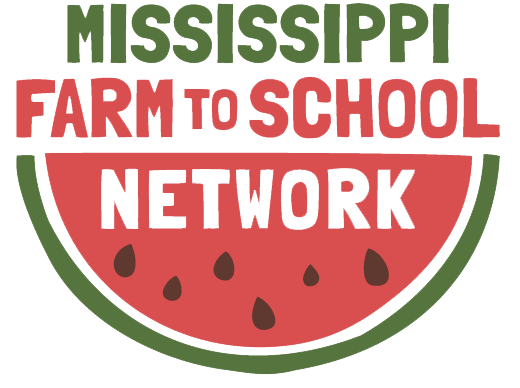Insights from the 2023 USDA Farm to School Census: A Path to Healthier Mississippi Communities
Nearly 50 enthusiastic students from Ms. Windham's culinary class at Gulfport High School planted over 120 crops, bringing their green thumbs to life at the 34th Street Wholistic Garden and Education Center in Gulfport, MS.
Farm to School brings together farmers, students, and communities to grow stronger, healthier, and more connected—creating lasting benefits for everyone involved. The National Farm to School Network defines Farm to School as programs that “enrich the connection communities have with fresh, healthy food and local food producers by changing food purchasing and education practices at schools and early care and education sites.”
What is Farm to School?
Farm to School benefits farmers, students, and communities alike. Connecting local farmers, fishers, ranchers, and food producers with schools creates reliable sales opportunities while ensuring students receive fresh, nutritious foods that support learning and growth. Farm to School includes local food procurement, hands-on learning, school gardens, and educational experiences focused on agriculture, food, health, and nutrition. These activities not only engage students but also enhance their understanding of where food comes from and its importance to their well-being. Beyond the classroom, Farm to School strengthens local economies, creates jobs, and strengthens family and community ties.
What is the USDA Farm to School Census?
The United States Department of Agriculture (USDA) Farm to School Census is the only national survey gathering detailed information on Farm to School activities. Its findings help schools, advocates, and producers understand how these programs support resilient local food systems and improve student health. The USDA’s 2023 Farm to School Census, sent directly to each school’s School Food Authority (SFA) in October 2023, gathered data about Farm to School activities during the 2022-2023 school year. The results, released in October 2024, provide valuable insights into the benefits and challenges of Farm to School programs, helping SFAs, policymakers, and advocates secure resources for expansion. We’re excited to share what this Census reveals about Mississippi’s efforts!
Building Local Connections Through Farm to School
Mississippi SFAs participating in Farm to School have prioritized key activities, such as sourcing and serving local foods, integrating food and agriculture education (including school gardens), and promoting local foods within schools. These participating SFAs reported notable results from their efforts, including increased fruit and vegetable consumption, improved food quality, more positive perceptions of school meal programs from students and staff, and reduced food waste.
During the 2022-2023 school year, Mississippi School Food Authorities (SFAs) participating in Farm to School invested $12 million in local foods—17% of their total food costs. The top local foods included milk, apples, beef, poultry, and tomatoes, highlighting a growing commitment to supporting local agriculture while providing fresh, nutritious options for students. Spending on locally produced foods generates significant economic activity within Mississippi, boosting farmers' incomes and supporting local jobs and businesses. By prioritizing local food purchases, SFAs in Farm to School improve school nutrition and strengthen the state's economy, fostering a cycle of local spending that benefits both farmers and communities.
Hands-On Learning and Food Literacy
Across Mississippi, 39% of SFAs reported providing food, nutrition, or agricultural education in 2022-2023. These programs teach children where their food comes from and how it affects their health, fostering lifelong healthy habits. Additionally, 11% of SFAs reported having edible gardens, offering students hands-on learning opportunities and essential skills to grow their own food. School gardens also help address food insecurity in Mississippi by increasing access to quality, nutrient-dense options. These experiences inspire students to pursue agricultural careers, paving the way for a new generation of farming professionals.
Growing the Future: Agricultural Careers
In Mississippi, 23% of SFAs reported introducing students to agricultural careers, highlighting efforts to expose students to the field. Agriculture is a key contributor to the state’s economy, making it essential to introduce students to various career paths, including both traditional farming and STEM-based roles that leverage technology such as drones for land surveying and crop monitoring. As the farming population ages, workforce development becomes increasingly vital, and by showcasing diverse agricultural careers, schools can inspire the next generation of leaders who will drive innovation and sustainability in the industry.
The Mississippi Farm to School Network’s Role
The Mississippi Farm to School Network strengthens these efforts by connecting schools with local farmers, providing resources to integrate agriculture into classrooms, and supporting hands-on learning through garden programs. Initiatives like the Mississippi Farm to School Week Challenge and Youth Leadership Program empower students and educators through nutrition, gardening, and agricultural activities.
By encouraging schools to participate in Farm to School, we promote healthier eating habits and catalyze economic growth. Helping students understand the value of growing, tasting, and preparing fresh, local foods fosters stronger community connections and economic activity, supporting farmers and local economies. Farm to School is a collaborative journey driven by the commitment of many dedicated stakeholders and partners across the state, all working together to nourish Mississippi’s communities for years to come.
Sources:
“Farm to School Census Results Overview.” USDA, farmtoschoolcensus.fns.usda.gov/census-results.
“What Is Farm to School.” What Is Farm to School, farmtoschool.org/about/what-is-farm-to-school.

